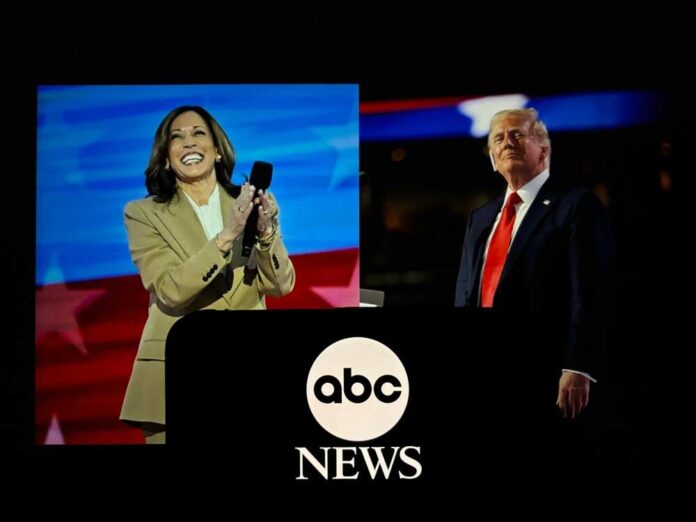
Trump Unleashes Fury on ABC News, Demands Mass Firing Over Debate ‘Disgrace’
In a scathing post-debate tirade, former President Donald Trump has called for the complete dismantling of ABC News, accusing the network of orchestrating a “rigged deal” during his face-off with Vice President Kamala Harris. Trump’s explosive reaction comes in the wake of what he perceives as unfair treatment by debate moderators David Muir and Linsey Davis, whom he labeled as “lightweight anchors.” This latest outburst underscores the ongoing tension between Trump and mainstream media, while raising questions about the integrity of debate moderation and the role of fact-checking in high-stakes political discourse.
Trump’s Explosive Reaction to Debate Moderation
Following what he claimed was a “GREAT DEBATE” performance, Trump took to his Truth Social platform to vent his frustrations with ABC News. The former president didn’t mince words, demanding that “everybody at ABC Fake News” be fired for what he deemed a disgraceful display of bias. Trump’s ire was particularly focused on the network’s decision to fact-check his statements during the debate, a move he viewed as a breach of pre-debate agreements and a clear sign of media prejudice against him.
Trump’s outrage didn’t stop at social media posts. In a subsequent interview with Fox News, he doubled down on his accusations, suggesting that ABC’s broadcasting license should be revoked for their conduct during the debate. “They’re a news organization. They have to be licensed to do it. They ought to take away their license for the way they did that,” Trump declared, escalating his attack on the network’s credibility and professionalism.
— The Western Journal (@WestJournalism) September 17, 2024
The Fact-Checking Controversy
At the heart of Trump’s grievances is the issue of fact-checking during the debate. According to reports, Trump was fact-checked five times throughout the event, while Vice President Harris faced no such scrutiny. This disparity has become a rallying point for Trump and his supporters, who argue that it demonstrates clear bias in favor of the Harris campaign. The former president didn’t hold back in expressing his view on the matter, stating, “I don’t think he had the right to correct me,” in reference to moderator David Muir’s attempts at real-time fact-checking.
“It was three-on-one. They continued to engage in so-called fact-checking of Donald Trump. They never did that to Kamala Harris,” – Sen. Tom Cotton (R-Ark.) –
This sentiment has been echoed by several Republican strategists and supporters. David Bossie, a longtime Trump ally, went so far as to accuse the moderators of acting as “agents of the Harris campaign.” Such statements underscore the deep divisions and mistrust that continue to plague American political discourse, particularly when it comes to media coverage of high-profile events like presidential debates.
The Broader Implications
Trump’s explosive reaction to the debate moderation raises important questions about the role of media in political discourse and the challenges of maintaining objectivity in an increasingly polarized environment. While fact-checking is generally seen as a crucial tool for maintaining honesty and accountability in political debates, the perception of uneven application can fuel accusations of bias and further erode trust in mainstream media institutions.
As we move closer to the 2024 election, this incident serves as a stark reminder of the challenges facing both media organizations and political candidates. Striking a balance between holding candidates accountable for their statements and maintaining the appearance of impartiality is no easy task, especially in an era where cries of “fake news” have become commonplace. The fallout from this debate may well influence how future political events are moderated and covered, potentially reshaping the landscape of political journalism in America.














